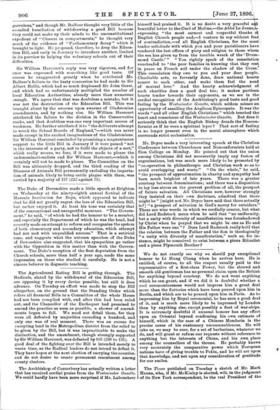Sir William Harcourt's reply was very vigorous, and for once
was expressed with something like good taste. Of course he exaggerated greatly when he attributed Mr. Balfonea failure to the hasty concession he had made to Sir Albert Rollit, which had so much displeased Sir John Gorst, and which had so unfortunately multiplied the number of local Education Authorities, already more than numerous enough. We agree that that was doubtless a mistake, but it was not the destruction of the Education Bill. This was brought about by the swarms upon swarms of Gladstonian amendments, and by nothing else. Sir William Harcourt attributed the failure to the division in the Conservative ranks, and that doubtless was one very important source of weakness. He further attributed it to " the deliberate attempt to wreck the School Boards of England,"—which was never made except in the excited imaginations of the Gladstonians. Sir William Harcourt concluded by promising a magnanimous support to the little Bill in January if it were passed "not in the interests of a party, not to fulfil the objects of a sect," which really means, we fear, if it were made to please the andenominationalists and Sir William Harcourt,—which it 3ertainly will not be made to please. The Committee on the Bill was ultimately dropped, and the third reading of the Diseases of Animals Bill permanently excluding the importa- tion of animals likely to bring cattle plague with them, was carried by a majority of 157 (232 against 75).
















































 Previous page
Previous page